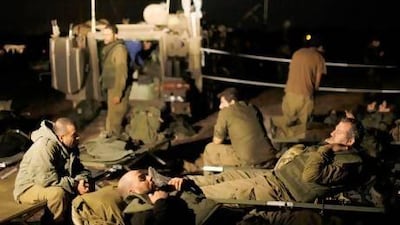CAIRO // Egypt announced last night that a ceasefire had been reached to end conflict between Israel and Hamas, starting at 11pm UAE time.
The news came at the end of a seventh day of violence, in which militants bombed a bus in Tel Aviv, injuring at least 15 people.
The announcement of the truce was made by the Egyptian foreign minister Mohamed Kamel Amr and the US secretary of state Hillary Clinton.
"These efforts … have resulted in understandings to cease fire and restore calm and halt the bloodshed," Mr Amr said.
Mrs Clinton arrived in Egypt yesterday for emergency talks to find a way of ending the week of hostilities between Israel and Hamas.
Her efforts were complicated by yesterday's attack in Tel Aviv - the first such strike in the coastal Israeli city since 2006.
A bomb was detonated on a city bus near the Israeli defence ministry, but it does not appear that a suicide bomber was involved. Hamas did not claim responsibility.
Israeli security officials said the bomb was left in a bag on the bus and the search was continuing for the perpetrator.
The office of Israeli prime minister Benjamin Netanyahu last night confirmed the ceasefire after he "spoke with (US) President Barack Obama and agreed to his recommendation to give the Egyptian ceasefire proposal a chance".
"This is a critical moment for the region," Mrs Clinton said.
"Egypt's new government is assuming the responsibility and leadership that has long made this country a cornerstone for regional stability and peace.
"In the days ahead, the United States will work with partners in the region to consolidate this progress."
If the ceasefire period holds for 24 hours, Gaza's border crossings with Israel would be opened further to allow freer movement of goods and people.
A Palestinian official said Egypt would act as guarantor of the deal.
Mrs Clinton was sent to the region in the middle of a tour of Asia with the US president, Barack Obama.
She first visited Israel late on Tuesday night where, after meeting the Israeli prime minister Benjamin Netanyahu, she promised "rock solid and unwavering" US commitment to Israel's security.
"In these days ahead, the United States will work with our partners here in Israel and across the region for an outcome that bolsters security for the peace of Israel, improves conditions for the people of Gaza and moves toward a comprehensive peace for all people of the region," she said.
Mrs Clinton also met the president of the Palestinian Authority, Mahmoud Abbas.
Hamas officials praised the Tel Aviv bus bombing and celebrations broke out in parts of the Gaza Strip over news of the attack. But Hamas did not claim responsibility.
"Hamas blesses the attack in Tel Aviv and sees it as a natural response to the Israeli massacres … in Gaza," its spokesman Sami Abu Zuhri said.
"Palestinian factions will resort to all means to protect our Palestinian civilians in the absence of a world effort to stop the Israeli aggression."
After the Tel Aviv bombing, Israeli launched a renewed round of air strikes, artillery and naval bombardment on Gaza.
Palestinian medical sources report at least 14 Gazans were killed yesterday, bringing the total to at least 149 Palestinians killed in eight days of attacks. Five Israelis have also been killed.
In Cairo, Mrs Clinton met Egypt's president, Mohammed Morsi, and Mr Amr, along with US ambassador to Egypt, Anne Patterson.
Mr Morsi and his intelligence services, which largely handle Egypt's Gaza relations, have been heavily involved in the crisis from the start.
Late last week, he took the unprecedented step of sending his prime minister, Hisham Qandil, to Gaza amid the Israeli air strikes.
Mrs Clinton praised Mr Morsi's "personal leadership and Egypt's efforts thus far" to end the conflict and promote regional stability.
The president, a former senior official with the Muslim Brotherhood, had sounded an optimistic note in recent days.
On Monday he predicted an imminent ceasefire announcement and said the Israeli attacks on the tiny, densely populated territory would end on Tuesday night. But that deadline expired with no progress.
Mr Morsi, like his predecessor Hosni Mubarak, faces mounting pressure to fully open the gates of the Rafah border crossing between Gaza and the Sinai Peninsula, the only entrance to Gaza not controlled by Israel.
Journalists, diplomatic delegations and some medical aid shipments have been allowed to enter but Gazan residents, with the exception of some emergency medical cases, find it almost impossible to leave.
Hamas has so far praised Mr Morsi and his government and hoped for a fresh start with Egypt after years of dealing with Mr Mubarak, who viewed the Islamist group with barely concealed hostility.
In recent days, Hamas officials have begun urging him to prove that Egypt has truly turned a new page.
"I call on Egypt to open the border crossing completely to goods and people and aid," Hamas leader Ismail Haniyeh said in a televised speech this week.
"We want this moment to restore the credibility of Egypt's leadership, its revolution and its spirit, to end the blockade once and for all."
* with additional reporting by Reuters

